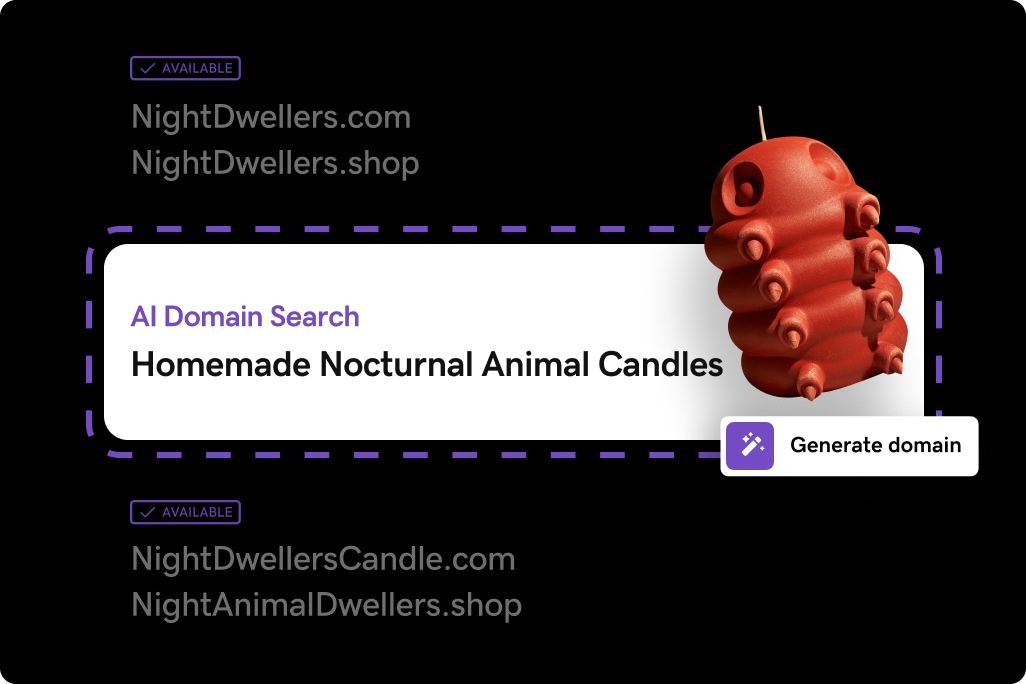Websites have become even more important to businesses and freelancers following the global lockdown from COVID-19. People are now choosing to frequent a website instead of the brick-and-mortar alternative.
More than ever, you need to know how to choose the perfect domain name for your business, personal blog, or portfolio website. There are a few important things to consider.
- Find a domain that’s easy for people to read and remember. Avoid misspellings, numbers, or hyphens. Choose “CoolDomainForYou.com” instead of “KewlDomain4U.com”
- Search for domain names that reflect your brand, whether that means including your name, slogan or keywords associated with your targeted niche.
- Select the right domain extension — aka top-level domain (TLD). This decision may depend on your business, industry, and availability. Browse the GoDaddy plans and pricing to find the right domain option for you.
Editor's Note: Discover the meaning and importance of domain names.
A domain extension is the combination of characters following the period in a web address.
The domain extension may seem like a subtle decision, but it can have significant importance. It’s used to designate the category or country code for a website. For instance, in GoDaddy.com .com is the domain extension and signifies that the website is for commercial use.
What are the five most common domain extensions?

When it comes to choosing the right domain, you should start with familiarity. Look for what domain extensions are most prevalent in your space and choose one that aligns with your brand and consumer expectations. This typically means selecting a TLD that is popular.
Here are five of the most common domain extensions to consider.
- .com — most popular domain extension for any business and widely recognized
- .net — good for tech or web-based companies since it derives from the term “network”
- .org — popular choice for non-governmental organizations or informational websites, but not suggested for commercial use
- .co — newer and shorter alternative to .com and more in line with younger generations
- .us — reserved for citizens and entities in the United States
The domain extension you select has a much more important role than you might think. Let’s explore the five most common domain extensions and why you should consider that extension for your new domain.
1. .com
A .com domain extension is hands-down the most popular TLD available. It was originally used to designate for-profit businesses, but has now become the go-to for domain extensions
When deciding on a domain extension, you should almost always choose .com — if it’s available.
The .com TLD is usually the best choice because it’s most familiar.
Humans are creatures of habit. We’ve all been typing .com domains into our web browser for decades, so it’s what we’ve come to expect from websites.
When we hear a domain or business name for the first time, we automatically interpret it as a .com domain because it’s the extension we’re most accustomed to.
Editor's note: Check out our company name generator and find ideas for your business and domain. Go ahead - check out our tool today!
In fact, if there is a .com for your domain that you don’t own, there is a good chance visitors are accidentally landing on that domain instead of yours simply because of human error. Some hackers are even purchasing the .com and other misspelled domains of your business for fraudulent scams on your customers — known as typosquatting.
The .com extension isn’t just the most popular because of its familiarity. Many SEO companies claim the .com extension can lead to more favorable search rankings. From a backlinking perspective, a domain with .com carries much more authority than one with a new or unfamiliar extension.
Thus, when conducting outreach for backlinks or PR, you’re going to seem more credible with a .com than another less-popular TLD.
The only negative to choosing a .com for your new website is that you may not have the option because it’s already taken. The rise of the internet brought a gold-rush type of movement with domains. Many entrepreneurs purchased popular domain names and eventually flipped them for more money — sometimes millions of dollars.
If your .com is not being used, you might have to pay a premium to purchase it from the current owner.
If you have the opportunity to get a .com, you should jump at it. Opt-in for a domain backorder if the desired name is already taken. This way, you will be notified when it expires and will be in line to buy it. However, if you can’t find a good .com — or don’t want to invest a lot of money to purchase it from a squatter — there are other TLD options to consider.
2. .net
Much like the .com extension, .net is open to anyone. What was originally intended for internet service providers or networks has now become a popular alternative to .com websites. The .net TLD might be a nice option for tech- or web-based companies because it implies network and technology.
Some of the most popular internet brands in the world have a .net extension:
- Slideshare.net
- Behance.net
- Slickdeals.net
Many people associate .net with web-based applications and services.
If your business operates in those industries, .net makes perfect sense and can help validate and communicate your services. In addition, .net is in less demand than .com, meaning there is a greater likelihood that your desired domain is available.
Because many people associate .net with technology, businesses that operate outside the tech space or web-service industries may want to avoid this TLD.
For example, if you operate a baking business and wanted a .net domain, you might think Cookies.net would be perfect. However, users might think your business provides a service for web cookies rather than edible baked goods. This disconnect could lead to confusion for visitors landing on your baking website.
One brand using .net effectively is SourceForge.net. They are a web-based service that provides an online community for people who need help with open-source web projects. It’s a collaborative community focused on networking and technology-based business.
SourceForge understands how their .net extension positions their brand, and they used it to their advantage to grow their credibility and community within the IT space.

3. .org
The .org extension was originally designed to represent not-for-profit organizations but is now available to anyone. It’s a popular domain extension for many non-governmental organizations, nonprofits, politicians and political parties, and online communities.
Many web users associate .org with a trustworthy and reliable source of information, but they don’t typically associate it with commercial brands.
The .org extension is one of the original TLDs, so it carries a lot of the same SEO benefits as .com. Additionally, .org is less popular than .com, which means you have a better chance to find your desired domain with that extension. Because of this, many organizations choose to build their website on the .org TLD — making it one of the most popular extensions.
While .org might make sense if you operate a not-for-profit or information-driven business, it doesn’t make sense for everyone. For instance, many people associate .org with communities and knowledge bases, so if you operate an ecommerce store, choosing a .org might not make the most sense. Most visitors are not expecting to purchase goods from a .org domain.
The websites that do the best using the .org TLD focus on building and cultivating communities. For instance, Wikipedia, Craigslist and WordPress are all brands that use .org. They all provide different services, but rely mostly on their communities and users to grow their brand and produce content.

4. .co
The .co extension was originally designated the country code for Colombia, but has become a popular option for global domains. While it’s an interesting option in the top domain extension list, it’s popularity has grown in recent years.
The .co TLD is a familiar acronym for company, corporations, or commercial ventures. This familiarity has led many forward-thinking entrepreneurs to build their brands on a .co domain extension.
Creating a website with .co makes sense if you are a business, particularly if you’re a young startup that markets itself as original or unique. While .com might be the most popular and widely accepted, .co is newer, shorter and more in line with the brevity of younger generations. This freshness could be a great way to diversify your brand and target a younger demographic.
You might also consider registering a .co extension because of its domain availability. As mentioned previously, premium .com domains are rarely available. And if they are, you’ll have to pay more than you might like. However, .co domains are less sought after, which gives you more flexibility and options.
With all that said, .co is still less recognizable than .com — and does carry less credibility and familiarity. You risk losing out on the reputation that comes with a .com extension, and if there is a .com using your existing domain, you could potentially be sending traffic their way. Sometimes, adding the “m” is just habit, so even if a visitor is trying to visit Cookies.co, force of habit could send them to Cookies.com.
500.co (aka 500 Startups) is a popular brand that uses .co. It’s a venture fund and seed accelerator that targets early-stage startups. They epitomize .co because their target audience is innovative, young entrepreneurs.

5. .us
Another popular domain extension is .us. Unlike the domains above, which are open to anyone, .us is reserved to citizens and entities in the United States. You can be an individual, corporation, or nonprofit organization, but you must be a permanent resident or have your business operations prominently in the United States.
The .us TLD was once associated with U.S. government — similar to the .gov extension. However, it’s now available to the public and enterprises. The websites that really excel with a .us extension brand themselves with an American or patriot identity.
A great example is vote.us, which provides nonpartisan information about voting in the United States. Other brands cleverly use .us to finish a phrase or word like whos.amung.us, which plays off, “Who’s among us?”
While the .us extension is perfect for creative brands and patriotic websites, it wouldn’t make sense for brands that don’t use patriotism in their marketing or operate in the United States.
Other domain extension options
The domain extensions above are a great place to start, but they aren’t your only options. In fact, there are more than 1,500 different TLDs available in addition to the five most common domain extensions already covered.
Below are some other popular options:
- .ai domain
- .io domain
- .gg domain
- .gov — Limited to government agencies
- .education domain — Limited to educational institutions
- .info — An open extension that is short for information
- .xyz — An open extension available for general use
- .ly — Country code for Libya, but used by many tech startups for creative spellings
- .site — A newer, generic domain extension that recently reached over 1 million registers in 2019
- .me - the .me domain is perfect for freelancers or consultants
There are a lot of considerations that go into picking out the perfect domain name. In addition to finding a name that reflects your personal or brand identity — and is easy to remember and type — you must also make sure the domain extension is available and aligns with your needs. If you’re looking to buy and sell a domain, the extension also matters in terms of domains value. For more on how to sell a domain, check this article.
If you’re looking to start a business and register a domain using one of the most common extensions, then you should consider GoDaddy. In addition to having a large marketplace of domains, GoDaddy has an integrated AI solution – GoDaddy Airo – that can take you from idea to online in just minutes. Choose one of their web hosting plans to host your website, set up your site with ease and promote your business using the Digital Marketing Suite. Also, try the Domain Name Generator to find your next domain name.








